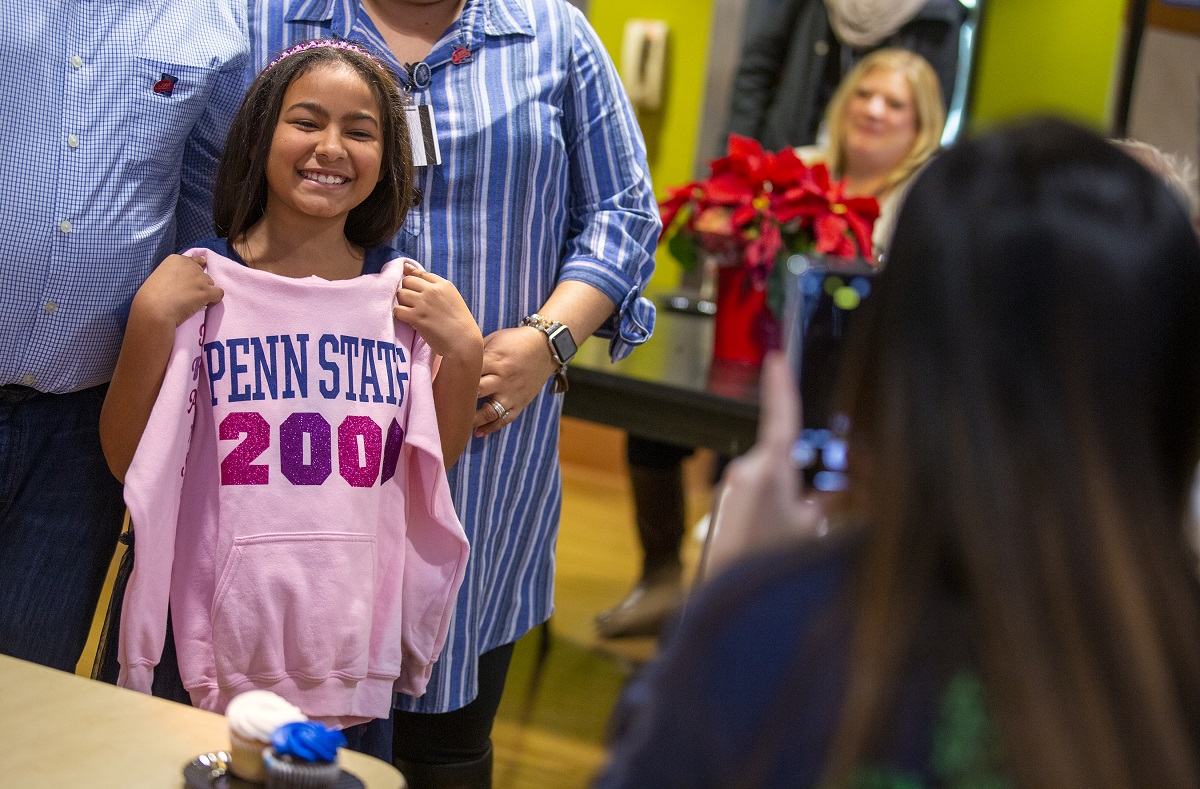At age 8, “a second chance at life”: 2000th kidney transplant recipient shares her joy

Months before she laid eyes on her newborn daughter, Luisa Vega knew she would name her Ruth, after a favorite book of the Bible whose theme is God’s provision.
It was that promise of care that Vega says got her and her husband, Carlos, through the first months of their daughter’s uncertain life and carried them to the day when Ruth became the 2000th kidney transplant patient at Penn State Health Milton S. Hershey Medical Center.
“This is a huge milestone for us,” said Dr. Fauzia Butt, transplant surgeon. “It means we’ve improved the lives of 2,000 people by giving them a second chance at life. People regain fertility, travel, attend graduations, weddings and much more. It’s an amazing feeling to have participated in that.”
Point at the image below to reveal slideshow player controls.

A dramatic start
After struggling to get pregnant, Vega worried her diabetes would affect her unborn child, so she was relieved she had smoothly carried her to term. Fourteen hours into labor, however, the fetal monitor suddenly detected no heartbeat, necessitating an emergency cesarean section.
“Ruth wasn’t breathing when she was born, and she didn’t breathe for seven minutes,” Vega said. The little girl would be diagnosed with chronic kidney disease, secondary to perinatal asphyxia — or deprivation of oxygen — associated with a placental abruption, which happens when the placenta separates from the inner wall of the uterus.
Ruth was transferred to Milton S. Hershey Medical Center at 19 days old to begin dialysis. She remained for three and a half months – through sepsis and a feeding tube — as doctors expressed doubt about a positive outcome, her mother said.
“I knew there was no one holding my daughter’s life but God from the beginning, and I believed he would continue to hold her,” Vega said. Ruth’s kidneys eventually began working on their own, but her family always knew at some point, they would fail.
In the meantime, Ruth grew into a vibrant, outgoing girl who loves singing in church and playing with friends. She is developmentally on track and extremely bright, her mother said.
Yet, overshadowing her seemingly normal life was the constant reminder that her kidneys weren’t working properly.
“We always knew she would need a transplant,” her mother said. Ruth was put on the waiting list in October 2019 because her renal function was deteriorating.
An awaited match
A well-matched, deceased donor kidney became available the following month, making Ruth the 2000th kidney transplant recipient. (As of this month, 2,034 kidneys have been transplanted.)
In the 37 years since the first transplanted kidney at the Medical Center – which also went to a pediatric patient — the program has greatly expanded, especially with donations by living donors, Butt said. “Living donation is the only operation we do where the patient receives no direct benefit – other than knowing the tremendous difference they are making in another person’s life,” she said.
“I was nervous, but also excited,” Ruth said, recalling how she felt as she traveled from her home in Lancaster County for the eight-hour surgery on Nov. 19.
Her transplanted kidney began working right away, and Butt remembers how she told the Vega family the good news. “I described it like ‘liquid gold.’ I saw the family exchange knowing glances and laugh,” she said.
At a pre-COVID celebration last December to mark the 2000th transplant, Butt learned the reason for their glances. Luisa Vega shared how she had been praying constantly about Ruth needing a kidney, and then she said that God came to her in a dream and said, “Don’t worry, when Ruth is ready for a transplant, I will provide a golden kidney for her.”
Vega said she took Butt’s reference to ‘liquid gold’ as a sure sign that God had provided this kidney, and everything would be OK. “There was not a dry eye amongst the attendees,” Butt said.
A renewed life
The Vegas already see that their daughter is more active since the transplant, and Ruth notices too.
“Before, I used to feel not that good, but now I feel much better. I can ride my bike longer,” Ruth said and suddenly turned shy. “I get really emotional – because God gave me another chance at life.”
When Luisa Vega talks about Ruth, she gets a little emotional too. “I had thought I wouldn’t have any babies at all, and I was always asking God to give me the opportunity to be a mom, just once,” she said.
Not all stories have happy endings like Ruth, Butt said. In fact, nationwide, 22 people die every day, waiting for a kidney that doesn’t come in time.
A chance to make a difference
“Hopefully everybody who reads Ruth’s story will be so inspired by it that they will become a deceased donor — or maybe even explore living donation through our transplantation program,” she said.
Users at clinical work stations can click here to view the video.
Kidneys from minority donors – historically few in number – are particularly needed because many of those waiting are minorities, Butt said. Compatible blood types and tissue markers are more likely to be found among people of the same ethnicity.
Ruth entertained the guests at the 2000th transplant celebration by singing Christmas songs and sharing a part of her sparkling personality — living proof of the difference that the transplant team’s dedicated work makes.
“We love Hershey Medical Center,” her mother said. “We’ve always had a lot of support there. They are always telling us, ‘We are here for you,’ and they always are.”
If you're having trouble accessing this content, or would like it in another format, please email Penn State Health Marketing & Communications.
